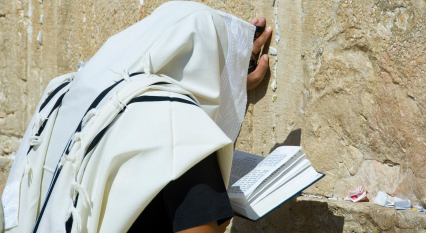Keeping Covenant With God
 It was customary in ancient times to seal a covenant deal with a meal. This ritual dates back to ancient empires and tribes long before the Torah. Some primitive tribes would prepare an animal, or more primitive groups would literally mingle the blood of the covenant parties in a cup of wine and both parties drink from it.
It was customary in ancient times to seal a covenant deal with a meal. This ritual dates back to ancient empires and tribes long before the Torah. Some primitive tribes would prepare an animal, or more primitive groups would literally mingle the blood of the covenant parties in a cup of wine and both parties drink from it.
Drinking or eating blood was strictly forbidden in the Torah (Lev. 17:12). The ancient concept was that through this act the two parties become one by partaking of the same blood. Blood was very important in every covenant ritual of the Hebrew nation. When publicly sealing God’s covenant with Israel, Moses sprinkled the sacrificial blood of a chosen animal on the altar, the Book of the Covenant, and the people (Exod. 24:6-8).
Blood was also sprinkled on the sacred tabernacle furniture, including once a year on the lid of the Ark of the Covenant. The ark was a large, gold-covered, rectangular box housing three sacred items: a golden pot of the manna (bread) that fell from heaven, the tables of the law written on stone, and Aaron’s rod (Heb. 9:4).
Yearly on Israel’s sixth festival, the Day of Atonement, the high priest entered the holy of holies in the tabernacle (later the temple), sprinkling blood seven times on the east end of the lid of the ark, called the mercy seat (Exod. 25:10-22; Lev. 16:14). The manna in the ark symbolized God’s covenant of provision, the tablets pictured God’s covenant of blessing for the Levites and the people, and the rod was God’s covenant of authority given to the high priest.
The first covenant meal was eaten when the first king and priest of Jerusalem, Melchizedek, provided a meal of bread and wine for Abraham after Abraham’s war victory over five kings (Gen. 14). Isaac had Esau prepare a last meal prior to receiving his father’s blessing. Rebekah, Jacob and Esau’s mother, realized this was a covenant of blessing meal and intervened to have Jacob pose as Esau to receive Esau’s blessing (Gen. 27:6-41). Jacob and his father-in-law, Laban, sealed their Mizpah covenant by eating a meal on a pile of rocks, which would serve as a visible memorial for future generations (Gen. 31:49-54).
For the Hebrew nation, the most important covenant meal was celebrated after God revealed His commandments on Mount Sinai. Moses sprinkled half of the sacrificial blood on the altar, representing God’s part of the agreement, and half of the blood on the people, representing their half of the agreement (Exod. 24:6-8).
The people sealed their part of the agreement by saying, “All the words which the LORD has said we will do” (Exod. 24:3). Afterward, Moses, Aaron, his sons, and seventy chief elders were invited to the top of the mountain where they “saw the God of Israel. And there was under His feet as it were a paved work of sapphire stone. So they saw God, and they ate and drank” (Exod. 24:10-11).
This meal sealed the deal between God and Israel. In Christian tradition, the Lord’s Supper, or Communion Meal, represents the blood and body of the Messiah and forms a spiritual bond between Christ and the believer, sealing our faith and confidence in the new covenant. Therefore Communion is the covenant meal.
After the special meal with Melchizedek, Abraham reconfirmed his covenant (Gen. 15:1-4) and presented a tithe (the tenth) of all goods to Melchizedek (Gen. 14:18-20). This act was significant and is mentioned by Paul: Even Levi, who receives tithes, paid tithes through Abraham, so to speak, for he was still in the loins of his father when Melchizedek met him (Hebrews 7:9-10).
Abraham was carrying the original Levi’s genes. Levi was a future great-grandson of Abraham, who would be born many years after Abraham met Melchizedek. The sons of Levi would become the priests in the tabernacle of Moses and in both Jewish temples, receiving tithes, offerings, and sacrifices from the Hebrew people. Both Moses and Aaron were from the tribe of Levi (Exod. 2:1; 4:14).
Abraham set the pattern for future generations to present the tithe (the tenth) of their animals, agricultural increase, and finances to the Lord in appreciation for His blessings on them individually and nationally.
















































